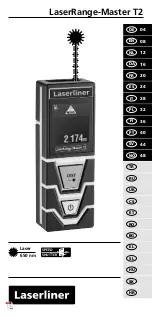
4
4.
INTRODUCTION
4.1. Description
This tension meter dynarope
HF 36/3 LPT is an electronic load cell that has been designed to
measure the effort applied in a wire rope without having to dismantle the installation.
The resulting signal generated by the sensor equipped with strain gauges is interpreted by a
digital display controlled by a microprocessor.
The display of the program has a database that contains a list of cables. The user selects from
the list the cable whose characteristics correspond to the one he wants to measure. (See details
in § 4.4)
The display corrects the force information (raw effort) based on the characteristics of the cable
to be measured. The measurement result is displayed on an LCD screen.
4.2. Characteristics
•
Capacity : from 500 up to 40.000 daN
•
Diameters : from 20 up to 44 mm
•
Accuracy : < 1% of full scale*
•
T° of use : -20°C to + 60°C
•
Protection : IP 65
•
Size of the packaging HF 36/3/LPT : 860 x 560 x 355 mm
•
Weight of the HF 36/3/LPT in its transport case : 37 kg
•
Net weight of the device: 15 kg
•
Power supply : 3 "AA" alkaline cells (located into the display)
Note: for efforts above 20 tons, we strongly recommend to purchase the hydraulic
assistance
* Precision obtained with the provided cable samples on a “BELAC” accredited test bench according to the method
PL-LAB-07
4.3. Data bank HF 36/3/LPT
The Standard data bank includes several items that are identified by a "Reference Number".
Each reference corresponds to a calibration process carried out on a particular sample.
The measurement wire rope is deemed to have a minimum length of 8 m, and is assumed to be
tensioned between a fixed end and a “flexible” end (e.g. an aerial mast) in order to render
negligible the influence of placing the sensor on the cable. Placing the sensor on the wire rope
causes a shorting of the wire rope by approximately 1,5 mm.
If the installation does not match the above description or if the cable you wish to measure does
not appear in the list, we recommend that a custom calibration is carried out (see § 8.3) or that
you order a specific calibration (see § 4.4).




































